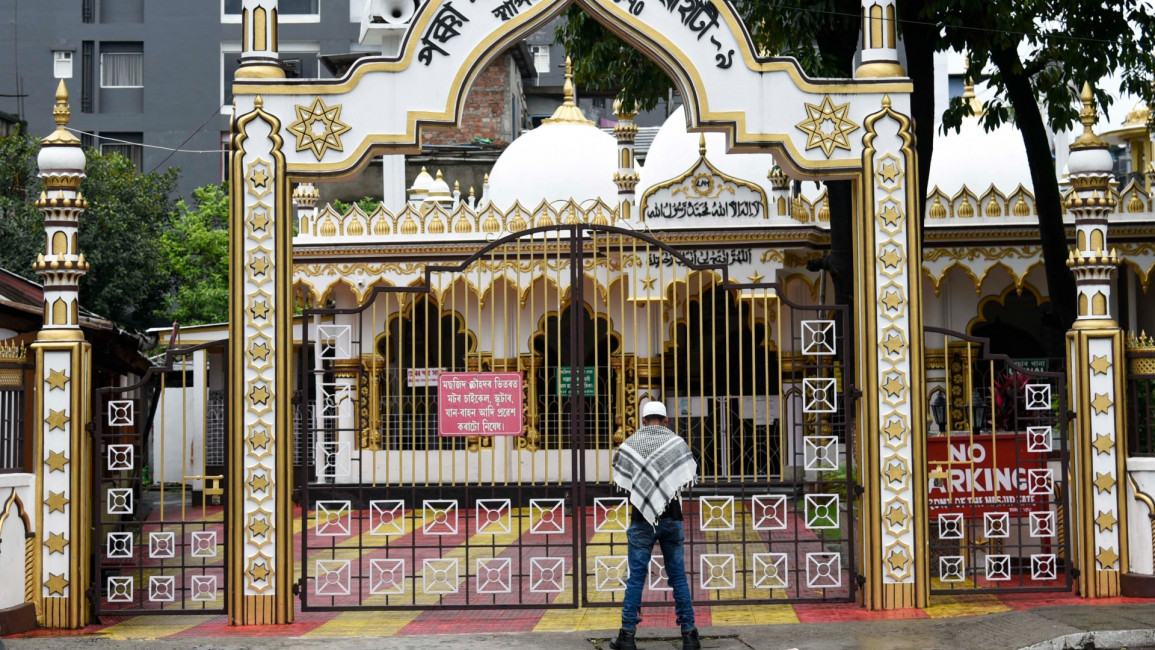India's Assam state passes bill banning Islamic schools
India's Assam state passes bill banning Islamic schools
The bill in Assam, home to India's notorious detention camps, replaces existing acts which legislated funding and support for Madrasas as part of state education.
3 min read
The BJP is deploying anti-Muslim rhetoric to win over undecided voters [Getty]
India's Assam state on Wednesday passed a bill that banned all public Islamic schools, the latest blow to Muslims in a region where the religious group face heavy oppression from Narenda Modi's governing Hindu nationalist party.
The bill in Assam, home to India's notorious detention camps, replaces existing acts which legislated funding and support for Islamic schools, locally known as Madrasas, as part of state education.
"We need more doctors, police officers, bureaucrats and teachers from the minority Muslim community, rather than imams for mosques," Assam's Education and Welfare Minister, Biswa Sarma, told a press conference.
He said that the government would no longer fund "the teaching of the Quran".
Prominent Muslim figures appeared on Indian TV to criticise the government's decision.
"I am a Madrasa graduate, after which I studied political science and attained both an MA and PhD. I have taught as a lecturer..I am an example of how children can excel even when starting out at a Madrasa," said Hafiz Rafiqul Islam, a Muslim politician for the All India United Democratic Front.
He added that Islamic schools taught core subjects and did not limit their curriculums to Arabic and Islamic studies, as claimed by BJP politicians.
Rafiqul Islam was joined by Moijudin Mamum, a member of the All India Muslim Personal Law Board, who told panelists on North East Live: "I studied at a Madrasa, and now I am a successful lawyer."
The bill came on the same day as an attack on a mosque in the central state of Madhya Pradesh.
Twitter Post
|
The crowd raised saffron flags and chanted "Jai Sri Ram" ("Glory to Lord Rama"), reminiscent of the actions of Hindu mobs who raided mosques during the Delhi riots February last year.
With local elections months away, opposition parties say that the BJP is deploying anti-Muslim rhetoric to win over undecided voters among the country's minorities, as they seek to strengthen the party's Hindu nationalist agenda.
With Assam sitting along the border between Bangladesh and Myanmar, public resistance to the influx of Rohingya migrants have served as a further rallying call for the BJP in past election campaigns.
Read more: Between virus and violence: The horror of being Muslim in India
The year 2020 was an especially difficult year for Muslims in India.
Anti-CAA protests led to the Delhi riots in February, where Hindu mobs attacked Muslims, causing the death of at least 53 people. Some 200 injured and thousands of others arrested.
The Citizen Amendment Act (CAA), widely referred to as India's 'Anti-Muslim law' grants citizenship on the basis of religion to non-Muslims living in Muslim majority countries such as Pakistan, Afghanistan or Bangladesh.
While national protests against the law died down in March, they were sparked again in Assam early last month.
With the wounds of the Delhi riots still raw, the recent 'Love Jihad' laws prohibiting women from converting to Islam in order to marry Muslim men and continued Anti-CAA protests, Muslim's challenges appear increasingly intractable in Modi’s India.
Follow us on Facebook, Twitter and Instagram to stay connected


![President Pezeshkian has denounced Israel's attacks on Lebanon [Getty]](/sites/default/files/styles/image_684x385/public/2173482924.jpeg?h=a5f2f23a&itok=q3evVtko)



 Follow the Middle East's top stories in English at The New Arab on Google News
Follow the Middle East's top stories in English at The New Arab on Google News


